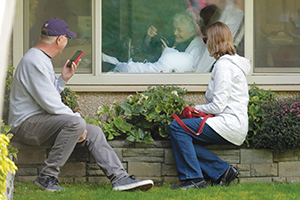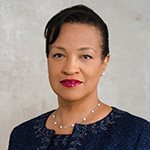By LISA EISENHAUER
The fact that the new "public charge" rule has been put in place just as the COVID-19 pandemic is spreading across the country is bad not only for immigrants affected by the policy but also for the public at large, a population health expert at Providence St. Joseph Health warns.

Judie Shape, center, who has tested positive for the COVID-19 coronavirus, visits with her son-in-law, Michael Spencer, left, and her daughter, Lori Spencer, right, on March 11. The family use phones to talk to each other at the Life Care Center in Kirkland, Washington. In-person visits are not allowed at the nursing home, which is a center of the outbreak of the COVID-19 coronavirus in Washington state.
The federal rule makes it harder for legal immigrants to gain permanent residency if they have had Medicaid coverage for 12 months within a three-year period, or federal nutrition or public housing benefits. The argument for the change was that people seeking citizenship should not be a burden on American taxpayers. Providence St. Joseph Health is among many health care providers and advocates who have taken stands against the public charge rule out of concerns that it could increase health disparities.
The coronavirus epidemic underscores that health is communal as well as a personal issue and that a higher number of uninsured who lack the resources to protect themselves or seek timely health care could have implications for the spread of the virus.
On March 13, the day President Donald Trump declared a national emergency related to the coronavirus, the U.S. Citizenship and Immigration Services clarified that it will not consider treatment or preventive care for legal immigrants related to COVID-19 as part of a public charge inadmissibility determination.
Immigrants who lack legal status in the U.S. are not eligible for Medicaid coverage and the public charge rule does not apply to them. The Kaiser Family Foundation reported that in 2017 more than four in ten immigrants without legal status were uninsured.

Dr. Medows
Dr. Rhonda Medows is president of population health at Providence St. Joseph Health and chief executive of Ayin Health Solutions, a population health management subsidiary of the health system. She says that even with the rule clarification for public charge determination, immigrants exposed to the virus are still likely to avoid needed care out of fear of jeopardizing their legal status or chance for citizenship so long as the overall rule is enforced. "Its purpose is still to exclude people with limited resources or in need of assistance," she says. "Immigrants may still be fearful of coming forward especially if they have used other services."
Medows says the enforcement of the entire rule needs to be put on hold.
CHA advocacy
CHA, too, is concerned about the public charge rule's potential to exacerbate the expanding health emergency around COVID-19, the coronavirus strain sickening tens of thousands around the globe. "Among the many harmful aspects of this rule, CHA has made it clear to the administration that the new public charge determination will hamper efforts to combat public health crises like the current pandemic," says Lisa Smith, CHA's vice president for advocacy and public policy. "Given the tremendous challenges we are facing, our focus should be on expanding health coverage instead of restricting it."
Though the public charge rule took effect Feb. 24, Medows says there is a lack of clarity about who it applies to and how it should be applied, in part because the rule is laid out in hundreds of pages of complicated terminology. "For the immigrant population and for the population of people who support them and care for them, there's a lot of confusion about who it is really directed at," she says. "Whenever there's confusion there also is generated fear."
Medows says the people frightened by the rule are already at risk of being missed by the efforts to staunch the pandemic. Due to language challenges, they might not be aware of the threat level in their community and the best practices to follow to avoid infection. In addition to her concerns about immigrants who are here legally or trying for legal status, Medows says she worries about those being held in detention centers as well as marginalized Americans who are on the streets and frail seniors residing in long-term care facilities.
Enforcement concerns
The United States Conference of Catholic Bishops issued a statement March 12 from the chairman of its Committee on Domestic Justice and Human Development, Archbishop Paul S. Coakley head of the archdiocese of Oklahoma City, urging lawmakers to be inclusive as they consider measures to provide relief and aid in addressing the crisis. "Special consideration is warranted for those most vulnerable: the poor, the elderly, the homeless, those in prison or detention facilities, immigrants and refugees, and those with severe underlying health conditions," the statement said.
Ashley Feasley, policy director for migration and refugee services for the USCCB, says the organization's concern that the public charge rule will keep immigrants from accessing services for which they are eligible is heightened by the current public health crisis. The USCCB is urging the Trump administration to repeal or suspend the rule in light of the health crisis.
In the meantime, Feasley says, the government's declaration that that immigrants with legal status can receive publicly funded care related to COVID-19 without imperiling their applications for visas or permanent legal status needs to be robustly disseminated in English and other languages so immigrants and their advocates are informed.
The USCCB also worries that immigrants who lack legal status will be afraid of facing deportation by federal authorities if they show up at hospitals or clinics, even though the U.S. Immigration and Customs Enforcement, and the U.S. Customs and Border Protection agency had previously issued memoranda establishing hospitals and other health care facilities as "sensitive locations" where immigration enforcement actions such as arrests, interviews and searches are to be avoided.
The USCCB wants the administration to clearly communicate that the protocol will be followed. "We want people to be accessing health services," Feasley says. "Just from a community safety standpoint, that is vital."
Unhelpful policies
The public charge rule is just one of several public or private health care-related policies that Medows views as unhelpful in the midst of a public health crisis. Another is the current attempt by several states, with the support of the Trump administration, to have the U.S. Supreme Court strike down the Affordable Care Act.
If successful, the challenge could end health care coverage for hundreds of thousands of people who have received Medicaid coverage under the ACA. It could also end the "essential health benefits" requirement in the law that mandates insurers cover preventive care and prescription drugs and a host of other health services.
Vice President Mike Pence, tapped by President Donald Trump to lead the nation's coronavirus response, has said that testing for the virus is specifically covered as an essential health benefit. "That means, by definition, it's covered in the private health insurance of every American, as well as covered by Medicare and Medicaid," Pence said at a press briefing March 4.
Care providers like herself, Medows says, have a duty to help educate the public on the risk of the illness and all the potential ways to get care, including through remote means such as telehealth and nurse advice telephone lines. She sees this duty as particularly important for providers affiliated with Catholic ministries like Providence St. Joseph Health that have a mission to help the voiceless and vulnerable.
"When we talk about the healing ministry of Jesus, that applies to everybody, there are not subgroups," Medows says. "If anything, if you're poor or vulnerable, it means we work harder. In the middle of a pandemic, it applies even more."